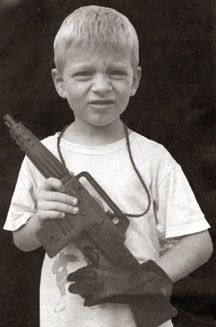
Children exploited in armed conflict
A year on, and despite marked progress in countries such as Sierra
Leone, Burundi, Liberia and the Democratic Republic of Congo, "over
250,000 children continue to be exploited as child soldiers by armed
forces and groups around the world," Radhika Coomaraswamy, UN chief Kofi
Annan's new Special Representative for Children and Armed Conflict, told
the UN Security Council recently.
She underscored (emphasised) the need for "long-term developmental
responses that will result in meaningful re-integration of these
children".

The Council turned the spotlight on the plight of children caught in
armed conflicts, with calls for a more robust (strong) mechanism to
monitor abuses and slap sanctions against offenders. At France's
initiative, the 15-member council last year adopted a resolution that
set up the first comprehensive monitoring and reporting mechanism system
to track six grave violations against children around the world.
The violations being monitored include killing or maiming, recruiting
or using child soldiers, sexual violence, abducting children or denying
them humanitarian access and attacking schools or hospitals.
Ann Veneman, Executive Director of the UN Children's Fund (UNICEF),
also urged stronger measures to combat the use of child soldiers as well
as sexual violence, particularly against girls, and curb the illegal
trade in small arms and light weapons.
"Since 1996, approximately two million children have died as a result
of war, while a further 12 million have been left homeless and at least
six million injured or physically disabled," she noted.
French Ambassador Jean-Marc de La Sabliere, the council president for
July, said the council must be ready to use all its "arsenal of measures
to punish those who defy (resist) its authority by refusing to comply
with its resolutions" on the protection of children in armed conflict.
He also underscored the link between security and development, noting
that lack of promising prospects for children undermined all prevention
and demobilisation efforts.
The meeting ended with the adoption of a statement underlining "the
importance of a sustained investment in development, especially in
health, education and skills training, to secure the successful
reintegration of children in their communities and prevent
re-recruitment."
The council also appealed to donors to provide additional resources
to fund the development of the monitoring and reporting mechanism and
the reintegration of children.
AFP
Research centre for medicinal plants
You may know or have learnt about the importance of our indigenous
medicinal plants. Although most of us rely on Western drugs now, this
doesn't mean that our local medication is any less valuable. In fact,
some of them could even be more effective, and besides, they pose less
side effects than chemical drugs.
So, that is why such plants need to be protected and their
cultivation improved. It's with the aim of conserving such medicinal
plants in Sri Lanka that the Indigenous Medicine Ministry has allocated
Rs. 1,479,000 to establish a research centre for medicinal plants. An
agreement was signed to this effect recently, between the Secretary to
the Ministry and the Agricultural Department of the Ruhuna University.
The Ministry has offered 50 acres of land in Kamburupitiya, Matara as
a herbal garden, to this project. The agro-technology for all medicinal
plants will be introduced through this project, which will also
introduce new herbal products like flavoured tea.
Protecting children from mental retardation
The recent commissioning of a new salt iodisation machine by Puttalam
Salt Ltd. is expected to boost Sri Lanka's drive to protect children
from preventable mental retardation. The machine supplied by UNICEF was
unveiled recently. Puttalam Salt produces about one third of Sri Lanka's
iodised salt supplies.

Iodine deficiency is a leading cause of preventable mental
retardation around the world. Salt iodisation provides a vital
micronutrient that supports children's health and protects them from
mental retardation.
UNICEF has been leading a long-term global campaign to protect
children, by encouraging and enabling families to use iodised salt in
their homes. The organisation in Sri Lanka, with substantial funding
from Kiwanis International, has invested heavily in salt iodisation
equipment, for salt producing companies.
Salt manufacturers in Hambantota, Puttalam, Mannar, Elephant Pass and
Kilinochchi have already been provided with iodisation machines, salt
washing machines and laboratory equipment, to monitor iodised salt.
UNICEF annually provides over 25,000 iodine test kits to be used by
health workers and public health inspectors, to monitor the iodine
content of salt in households and shops.
The Government driven initiative to establish universal salt
iodisation has now borne fruit, and the percentage of households using
iodised salt has risen from 48 per cent in 1996, to 93.6 per cent in
2005. Goitre, a swelling of the neck caused by iodine deficiency, had
gone down to 3.8 per cent in 2005, from 20 per cent in 1987.
The Government has also passed a law, banning the production,
distribution and sale of non-iodised salt for human consumption, as part
of the iodisation measures.
Amal exhibition and competition
The organising committee of Amal International School will hold and
Islamic Art and Arabic Calligraphy Competition and Exhibition to
celebrate the school's 15th anniversary and to promote Islamic art and
Arabic calligraphy. The competition and exhibition will be held on
September 16 and 17 at the Amal International School auditorium.
It is open to students of Amal International School, Arabic colleges,
madrasas and other government and international schools.
The art work should include
i. Work on Islamic Art-describe its nature and meaning in small
English letters,
ii. Arabic calligraphy with words and / or phrases from the Holy
Quran with its meaning in English, Sinhala or Tamil,
iii. Art works or paintings of famous mosques in Sri Lanka and / or
abroad - mention name of the mosque, place and country,
iv. Creations of new mosque designs with minarets.
All exhibits should be on bristol board, hard board, wood or plain
glass within minimum (normal bristol board) size. Name, Address,
Institution, School-Grade of the participants, should be mentioned
clearly on the bottom right hand corner of the exhibits, and certified
by head or teacher-in-charge of the respective school or institution.
Winners will be awarded with "Amal 15th" Anniversary Celebration
Trophy" at the Grand Annual Prize Giving to be held in December, at the
BMICH.
All exhibits should be sent to: The Principal, Amal International
School, No. 152, Dharmarama Road (off Havelock Road) Colombo 06, to
reach on or before August 30 or handed over at the school office between
10.00 a.m. to 5.00 p.m. during school days only. |


